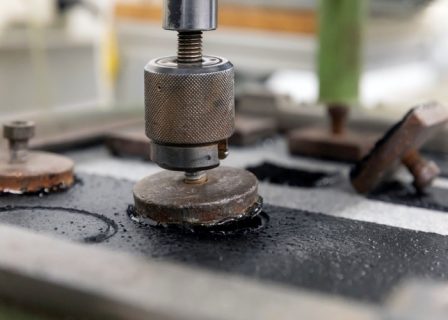VINNEVA®, booster for bitumen coatings. As a binder in asphalt, bitumen can be found virtually everywhere. It furthermore serves as a water-repellent coating for roofs and walls. Here, polymer-modified products, which are more flexible and thus more resistant to mechanical influences, are often used. With VINNEVA®, Munich-based chemical company WACKER launched a new product line for polymer-modified bitumen emulsions. The polymers ensure that coatings adhere exceptionally well to building fabric for a long time. They moreover reinforce the barrier effect against water pressing in on a basement wall or other building parts.
Refineries around the world obtain bitumen from crude oil by vacuum distillation. Bitumen finds use in road construction and water-repellent coatings for building parts, for example. In the Middle East and Africa (MEA), these coatings are usually polymer-modified, i.e. they contain polymers that enhance the property profile. In other regions of the world, they are used without polymeric additives. Nevertheless, the market for polymer-modified bitumen is growing. According to a study by Global Market Insights[1], the sector generated sales totaling some US$9.5 billion in 2016. Market researchers are expecting an average annual growth rate of four percent until 2024.
WACKER has developed binders based on Vinyl Acetate-Ethylene (VAE) copolymers specifically for bitumen emulsions under the tradename VINNEVA®. On the one hand, the product line is intended to convince users of non-modified bitumen emulsions of the benefits of a polymer additive – this makes the coatings more flexible and more resistant to all kinds of mechanical stress. On the other hand, VINNEVA® offers several advantages over polymers that have been used in bitumen emulsions to date. These are mainly elastomers, i.e. rubber-like substances, such as Styrene-Butadiene Rubber (SBR) and Polychloroprenes.
Excellent Adhesion to Building Fabric
A VINNEVA® content of several percent – depending on the formulation – increases the performance of bitumen tremendously. VINNEVA® modified formulations outperform other modified bitumen emulsions, especially when it comes to tensile adhesion strength and elastic recovery. Extensive tests at WACKER’s laboratories have shown that the tensile adhesion strength increases by up to 60 percent compared to conventional modified bitumen emulsions.

In order to test tensile adhesion strength, technicians first apply the bitumen emulsion to a concrete slab. Once it has dried, they cut circular test areas into the coated slab and stick a metal test piece onto each one of these areas. The technicians then measure the force required to pull the test pieces, including the bitumen coating sticking to them, from the concrete. The higher the necessary force, the more difficult it is to detach the coatings from the building fabric, i.e. the stronger their adhesion to it.
More Resistance to Water Pressure
A bitumen coating’s most important function is to protect basements, roofs or entire buildings from the ingress of water. In order to test how well a coating fulfills this function, technicians apply it to small concrete cubes and allow it to dry under specified climatic conditions. In a special facility, they then expose the coated cubes to an adjustable water pressure for 7 days, for instance. After this time, they measure whether any of the originally used water has been “lost” due to ingress into the concrete cube. These kinds of tests have demonstrated that bitumen emulsions that have VINNEVA® added to them can withstand positive water pressure.
There are further properties that characterize VINNEVA® modified bitumen emulsions. One sample formulation took 3.5 hours to dry, for example. When the VINNEVA® component was replaced with another polymer – with the formulation otherwise the same – the drying process took 4.5 hours. The dried coatings based on the new polymer are furthermore less sticky than various other systems. In many cases, shorter drying times represent increased productivity for end customers, which can make the bitumen emulsion less costly to apply.
Methods of Polymer Modification
It must always be taken into account that the properties of a bitumen emulsion do not just depend on the polymers used, but also on the bitumen composition and other additives. Bitumen is a mixture of heterocycles, polycyclic aromatic hydrocarbons, and branched hydrocarbons with varying degrees of saturation. Depending on where the crude oil is sourced, the proportion of these compounds in bitumen varies greatly.
Coatings are based on bitumen emulsions that can be produced in colloid mills from hot bitumen and water that contains additives. There are two ways of modifying bitumen coatings with a VINNEVA® polymer: the polymer is either added to the water jet before the emulsion forms or to the bitumen emulsion at the end, In the MEA region the latter method is commonly used
This is why, for its customers, WACKER individually tailors its VINNEVA® polymers to the bitumen composition and additives. Experts at WACKER’s local technical center in Dubai provide support here. It is thus possible to formulate coatings that are superior to products based on other polymers with regard to key properties such as elasticity, elongation at break and watertightness.
VINNEVA® polymers are not only based on petroleum, but also on natural gas. That’s why their price fluctuates less in the long term than that of other polymers used for bitumen modification. In addition, unlike some other additives, they do not contain chlorine.

Suitable for water based primer for Waterproofing Membranes (WPM)
VINNEVA® polymers can also enhance fiber-reinforced or filled bitumen coatings. In the MEA region, water based bituminous coatings are used as a primer for water proofing membranes (WPM), as well as back coatings for facades
Summary
VINNEVA® polymers enhance the properties of bitumen-based building coatings. Thanks to the new polymers, the coatings adhere particularly well to concrete and masonry. VINNEVA® modified bitumen furthermore protects roofs and basements, for example, from the ingress of water.

Leave a Reply